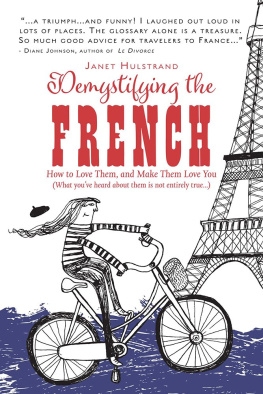Copyright Janet Hulstrand 2018. All rights reserved.
Winged Words Publishing
www.wingedwordseditorial.wordpress.com
Print ISBN 978-1-54395-351-0
eBook ISBN 978-1-54395-352-7
No part of this book may be reproduced in any form, or by any means, including photocopying, recording, or any other electronic or mechanical methods, except in the case of brief quotations in a book review, without written permission from the author. Any other use constitutes unlawful piracy and theft of the authors intellectual property.
Although the author has made every effort to ensure that the information in this book was correct at press time, the author and publisher do not assume and hereby disclaim any liability to any party for any loss, damage, or disruption caused by errors or omissions, whether such errors or omissions result from negligence, accident, or any other cause.
For any inquiries regarding this book, please email:
For all those wonderful Frenchmen and women
who have given me the benefit of the doubt
time and time again, even when I forgot to say Bonjour.
Merci de votre comprhension!
Acknowledgements
First a tip of the hat to the writers who helped me understand the French better myself, especially Julie Barlow and Jean-Benot Nadeau, Polly Platt, Harriet Welty Rochefort, and Sally Adamson Taylor. I also want to thank those friends and fellow Americans who enthusiastically agreed to answer my questions on the flimsiest of information about what I planned to do with their answers when I first set out to write this book. For this and for many other acts of kindness, friendship, and professional support, I am deeply grateful to David Downie, Karen Fawcett, Ellen Hampton, Gary Lee Kraut, Adrian Leeds, Harriet Welty Rochefort, and Penelope Rowlands, not only for having shared their invaluable insights and perspective for this book, but for a multitude of other kind and supportive acts in past years. Mille mercis! Thanks also to Mary Winston Nicklin and Bonjour Paris for giving me the opportunity to interview so many interesting writers, and for permission to quote from some of those interviews in this book. Finally, for answering my questions from the French side of the fence, I am grateful to Thierry Boussard who, with imagination and keen insight taught my boys and so many other boys to speak French, and to enjoy doing so (!)
Many thanks also to the BookBaby team, especially to Matthew Idler for his patience, encouragement, and expert guidance through the process. I also want to thank Susan Keselenko Coll, and Politics and Prose bookstore, for the opportunity to teach classes there. Teaching at P&P was truly one of the most satisfying parts of my life in Washington: it gave me the opportunity to begin to organize my thoughts about France and the French, as well as to share what I had learned with othersa most rewarding experience!
As she has done throughout my career, Anne Kostick provided excellent general editorial advice and guidance; and Ginnie Coopers encouragement and support was key to the publication of this book. I am also grateful to Stephen Rueckert for his support and friendship over the past 40 years (and for a couple of the anecdotes included here). And to my sons Phineas and Sam Rueckert, just for being who they are, and for nodding approvinglyand instantlywhen I told them I was going to write this book. (Youd be good at that, they said.) You two are simply the best.
Compare then, I say, as often as the occasion presents itself...
the process is both instructive and entertaining...
- Henry James
Introduction
A friend of mine once told me that during the course of a conversation with a friend of hers, for some reason the friend (who is neither French nor American) said, You know, its funny about the French and the Americans. Both of them always think theyre right about everything.
Not surprisingly, as an American, I was surprised by this remark. Though I love France and I have spent a great deal of my adult life there, I would never in a million years think of Americans being compared to the French in this way.
Though I love the French and admire many things about them, I think of them as requiring special handling, whereas I think of Americans as being easygoing, freewheeling, and much more flexible in their approach to life. I dont think of us as holding to a right way of doing thingsin fact, in my mind, thats one of the best things about uswhereas the French place a great deal of importance on being correct .
But however you look at it, one sad fact of life is that Americans traveling in France often get off on the wrong foot with the French people they encounter almost instantly: this often leads them to believe that all those nasty things theyve heard about the French are truefor example, that they are rude; arrogant; and that they hate Americans. (These unfortunate encounters also lead the French to believe that Americans are pretty rude too, though Americans tend to not even be aware of this.)
None of these things are true. In fact, I have tried to protect my French friends from the knowledge that many Americans feel this way, because I think it would hurt their feelings, and would also be simply incomprehensible to them.
In any case, it doesnt have to be this way! With just a little bit of specialized knowledge about what the French expect in terms of good manners, Americans (as well as other foreigners) can pretty easily get off on the right foot in France. And that can lead to one of the most pleasant experiences I can imagine. In fact, for me spending time in France has been so pleasurable that Ive had a hard time talking myself into going anywhere else for many years now.
A few years ago I was given the opportunity to teach a class at Politics and Prose bookstore in Washington D.C., in which I shared some of the knowledge I had gained over the years about getting along in France. In this class, which was called Demystifying the French, and in a follow-up class, Parlez-Vous Anglais? Survival French and French Travel Tips, I gave my students a few basic pointers about how to do a better job of dealing with the French, and I wrote a few blog posts to accompany the classes. This book began with those few posts, in which I offered a few simple rules of the road Ive come up with, based on nearly 40 years of learning how to get along better in France.
The first part of the book is simple: five essential tips that I believe are necessary for even the briefest of encounters with the French, with brief explanations of the psychology, history, or reasoning behind the tips.
The second part of the book goes deeper and into much more detail about what makes the French tick. In this part Ive told stories about some of the things that have happened to me, or that I have observed, or heard about from others. I decided to ask some of my American friends in France as well, people who have lived here for a long time, about some of the kinds of situations that come up frequently, and that cause confusion, embarrassment, or just plain misunderstandings between French people and Americans, and to explore with them some of the fascinating aspects of this very interesting people.
Several of these friends reminded me, before answering my questions, that to make cultural generalizations is of limited value, and always introduces the risk of sliding into stereotyping. Before answering his questions, David Downie said, Generalizations are dangerous. I try to avoid them. But like everyone else I wind up using them as a form of shorthand. Gary Lee Kraut struggled with some of my questions too, pointing out that Life in France is more diverse than your questions imply. But he kindly agreed to try to play the game, because hes a nice guy and a good friend. Inhabitants of France are less likely to get shot, less likely to have a household income over $100,000, less likely to be obese, less likely to worry about health insurance, he said. He added, They are also more likely to smoke, more likely to study or learn some history, more likely to be an atheist or nonreligious, more likely to have vacation, more likely to be asked to comply with regulations, more likely to spend more time sharing a meal, etc. He concluded, I suppose you can add these things up and get a difference.









